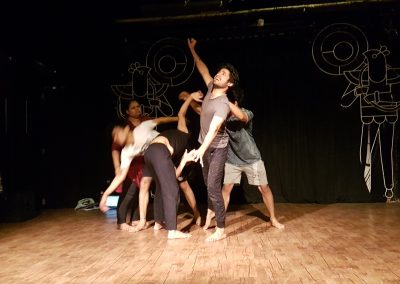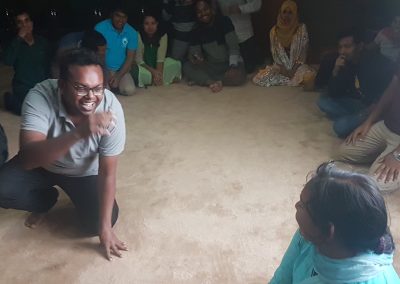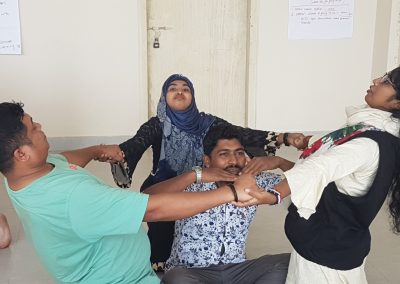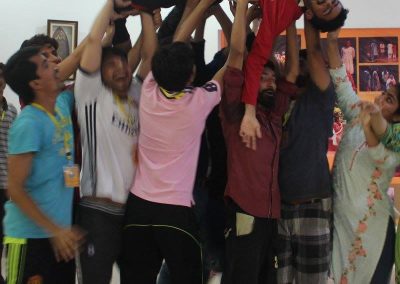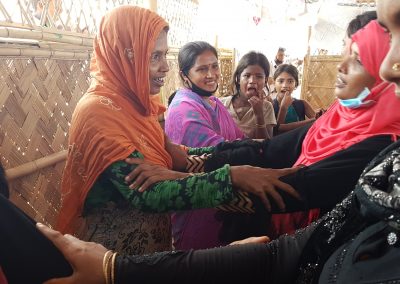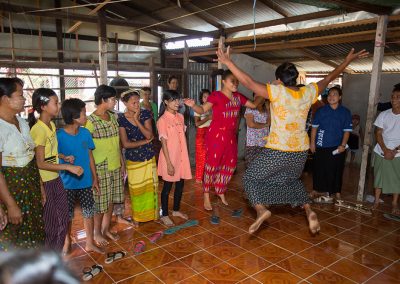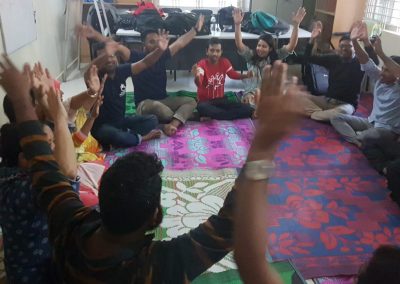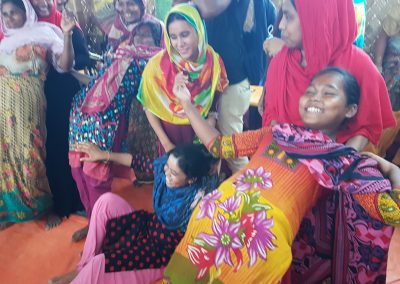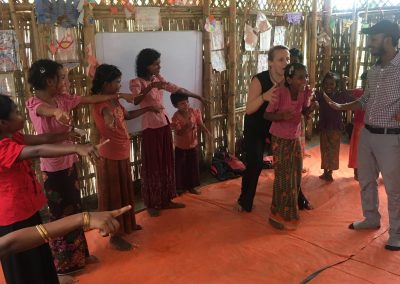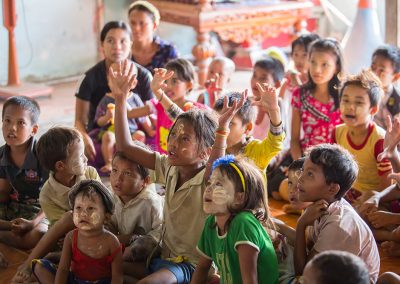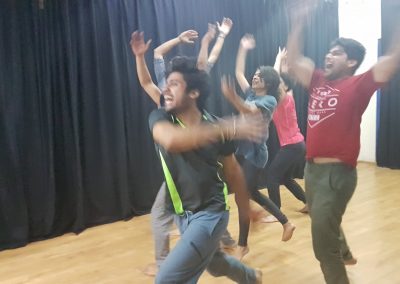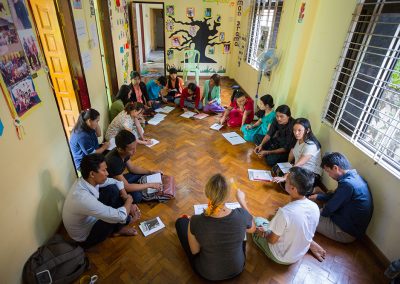Training
“Melissa’s training workshops are incredibly transformative” Adam Stapleton, Co-Director Governance and Justice Group
Arts for Action has trained thousands of people in diverse settings: from actors to paralegals, Over the years trainings have been tailored for different groups, including: young people, street kids, prisoners, women affected by violence, refugees, paralegals, prisoners, counsellors, local authorities, political leaders, nurses, farmers, students of theatre, professional performers, dancers, choreographers and directors. Arts for Action’s unique and trailblazing Physical theatre and Interactive social research enables communities to be at the centre of communication and community engagement.
Trainings are usually tailored to suit trainee needs and range from teaching development practitioners to use theatre-based learning methods, to teaching artists about justice and human rights. All our training is practice based – meaning participants learn-in-action and through discovery, learning as much from each other as the trainer. Training for professionals, non-professionals, students, activists and oddballs are available in the following:
Quick Links: 1. Facilitation | 2. Playmaking | 3. Devising socio-political theatre | 4. Applied Physical Theatre | 5. Forum theatre | 6. Programme Design | 7. Being an artist and Development Practitioner | 8. Interactive social research | 9. Measuring change through arts action | 10. Communication for Development (C4D)
Training is always participant-centred and tailored to the needs of the group. Arts for Action practitioners have extensive experience providing training across many disciplines. Training workshops can be one-off or built into a programme. Broadly, training and workshops can be provided in the areas below.
Training opportunity: Building Transformation
Participatory Community Engagement using Physical and Forum Theatre
In May 2024 Arts for Action will run a 6 session online course covering the basics of what you need to design and implement a participatory community engagement project that combines physical and forum theatre techniques, interactive social research, and creative approaches to effecting and measuring positive change.
For more information and registration, click here.
Training areas
Facilitation
Principles and practice of:
• Facilitating creative processes
• Facilitating interactive learning processes
• Facilitating training
• Facilitating group drama therapy
Facilitation training can be useful for performing artists who wish to apply their craft to social or personal development or improve leading a group: for learning or creative purposes. Training can also apply to professionals outside the arts sector who would like to use creative processes and/or drama in their work.
The Art of facilitation is the art of becoming invisible
Melissa Eveleigh
Training can include: group dynamics, use of dialogic pedagogy, Paulo Freire’s principles, Augusto Boal techniques, learning-by-discovery, co-creation, participatory methods, use of creative learning techniques, environment, risks and safe-space, tone, listening, jumping roles, use of play, monitoring and evaluation.
All training is practice based – meaning participants learn-in-action and through discovery, and learn as much from each other as the trainer.
I learned to face my fear and take my space, then give it away.
Participant,Bangladesh
Playmaking
This can be given at different levels, from basic to advanced. Including:
Training in playmaking can be applied to developing message or issue-based plays as well as plays with alternative artistic ambitions or visions, and covers research, developing premise, plot, structuring narrative and scenes, creating character, development of character, playmaking with professionals, playmaking with community groups and students, African theatre, political theatre, use of myth or folk tale.
Making and playing with masks, naturalism or stylised forms; comic territories such as clown, bouffon, commedia dell’arte or farce; tragic territories: melodrama, chorus, journey of the hero, tragedy rooted in individual human flaws, tragedy structured around historical, social or political events or forces. In summary, over a 1 month it’s possible to cover in introduction:
• Nuts and bolts: dramatic action, protagonist/antagonist, narrative, character, conflict, atmosphere, viewpoint, real, surreal, abstract, representative
• Principles: rhythm, space, image, form, text/subtext, push and pull
• Comic Territories (Basic: Clown, Bouffon, Commedia, quick change, farce)
• Tragic Territories (Basic: Chorus, Melodrama, Journey of the Hero)
• 5 scene structure
• 3 act structure
• Inner conflict, external conflict, alternative points of view
• Verbatim text, physical text, improvised text, written text
Training can also be given in rehearsal process and production outside traditional theatre spaces – this is often necessary in contexts with less formal arts training available.
Devising socio-political theatre
– Workshops can incorporate the history and principles of devising social and political theatre, especially how this theatre form developed in Southern Africa, Latin America and South East Asia. Arts for Action founder has specialist knowledge of Protest theatre and theatre for development in Southern Africa, practitioners in the network are mostly engaged in this.
– Drawing on specific experience devising socio-political theatre in Malawi and Zimbabwe, workshopping this would include approaches to protest, defining aims and audience, negotiating agendas, managing risks and dominant narratives, involvement of legal and political framework, voices and perspectives, framing statements, structuring conflicts, ambushing, use of media.
Looking at, but not exclusively:
• What can theatre change, and how?
• Newspaper theatre
• Protest theatre
• Verbatim theatre
• Investigative/journalistic/Documentary
• Ideologies
• Points of View
• Alienation, emotional truth and defining ‘voice’
• Audience involvement (pre, during and post-show)
Applied Physical theatre
This training is based on specific workshops developed exploring The Artist and Society: Moving into political voice
Melissa draws upon her practice applying theatre for development whilst working in Sub Saharan Africa and South East Asia, and shares an approach that combines physical play, forum theatre, social change and activism.
This training explores the use of chorus, contact and internalisation to find political voice and look at how physical dynamics can be used to illuminate and build upon Augusto Boal’s Theatre of the Oppressed. This includes applications of image theatre and Rainbow of Desire techniques and explores how these have been developed through practice in Malawi, Zimbabwe, South Sudan and Myanmar to achieve women’s empowerment, policy dialogue, conflict resolution and increased access to justice in these contexts.
Through practical physical exercises, participants embody political actions, power dynamics, images of injustice and conflict, and interrogate how movement and chorus can speak of and to society. Moving beyond Boal, this training asks how performance and audience engagement can activate change? How can these changes be best defined and measured? And who is best placed to do this?
Creativity of the performer is at the centre of this work, meaning the thematic direction is defined by the group in the end. This is appropriate for applied theatre students, development or sociology students, professional performers, dancers, choreographers, theatre makers, facilitators, social workers and those involved in a change-making process.
Forum theatre
Training in how to make and facilitate Forum Theatre is best linked to an actual project – as it is only through practicing these techniques in the context of the participating audiences, that all that’s required can be experienced.
How to make and use Forum theatre could include (but is by no means limited to):
1. Practical nuts and bolts of Forum Theatre
• Image theatre – constructing/deconstructing reality
• Defining / researching ‘the issue’ or problem (internal/external processes)
• Clash of Wills
• Classic Oppressed/Oppressor plot structure
> Alternative narrative structures for Forum plays
> Playing the Joker, facilitating the Forum.
> Techniques for audience engagement, pre, during and post-show.
• Exercises to research, create, rehearse and facilitate forum theatre events with community members.
▪ Measuring and evaluating impact.
2. History and application
• History and evolution of Forum Theatre.
• Application of forum theatre in Africa and India (what works, what doesn’t, lessons learnt by theatre-for-development movements)
• Trends in Theatre for Development
• How to design social research processes that draw upon games and drama exercises.
• From research to story
3. Interactive learning
This mainly deals with creative methods for interactive learning, but incorporates group learning methods also. Approaches can be adapted and applied with different age groups: from 7 – 107!
> Science of learning through interactive methods, and overview of key stages.
> Designing and delivering interactive learning: cognitive, emotional, psycho-social, kinaesthetic
> Use of games, including adaptation to topic
> Applying principles of creativity
> Facilitation technique
• Principles (Freire, Boal etc)
• Use of games
• Learning through creativity, song, enactment, art
• Learning with emotion
• Child-centred learning
• Adult learning principles, inc. appreciative enquiry
• Learning through instant theatre/role play
3. Fundraising
• Developing a fundraising strategy
• Mapping funders and competition
• Process for matching funders and partners to vision and goals
• Pitching & proposal writing
• Managing the funder/implementing partner relationship – dynamics & communication
Programme Design
Mostly for arts or communication for development projects
• Basic project management tools (roles, responsibilities, targets, planning – including GANTT project management tool)
• Budgeting
• Co-existence of core values and budget justification
• Donor and INGO regulations (eg. Reporting requirements for EU, USAID, NORAD)
Being an artist and Development Practitioner
• The Performer-project manager-facilitator-researcher- social worker- administrator
• Managing ideal vs reality in development or community context
Interactive social research
• Traditional social research methods
• Interactive Techniques for establishing knowledge attitude behaviour
• Models for mapping participant
Measuring change through arts action
• Mapping immediate audience or participant experience
• Monitoring short term impact
• Evaluating mid-long term impact upon individuals or groups – specifically in relation to conflict resolution, good governance, health seeking behaviour and access to justice)
Communication for development (C4D)
• History 1960s – present – connects to shifts in thinking about the meaning of ‘development’
• Design and implement a C4D campaign (long or short term)
• Knowing your audience
• Co-creating a strategy with your audience
• The language of change – into programming communication objectives
• Relevance of different media and communication tools for different issues and change objectives
• Radio soap opera
• Radio magazine
• Interactive radio
• Community radio
• Social marketing
• Social media engagement
• Combining mass media with local action.

